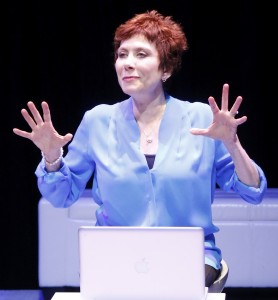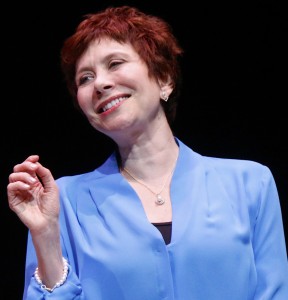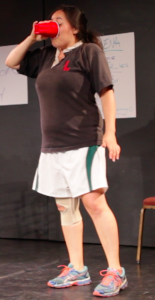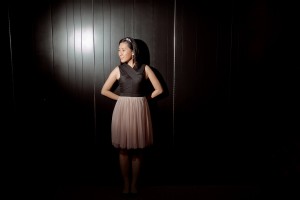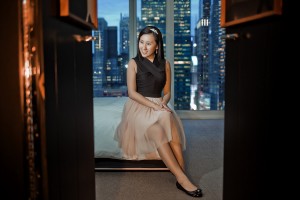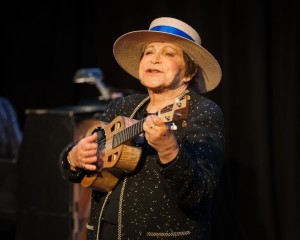Comedian Faith Salie’s new solo show Approval Junkie, based on her book of the same title, is funny, insightful and heartfelt. Salie is an Emmy Award–winning journalist best known for her roles on NPR's Wait Wait…Don’t Tell Me! and CBS Sunday Morning. In her one-woman show, Salie begins with the adolescent need to seek approval. Her play explores the concept of the human need to be accepted and even revered.
High on the Buy
Shoes and Baggage is a wildly entertaining one-woman show that explores shopping, and life. Written and performed by stage veteran Cheryl Stern (whose Broadway credits include La Cage aux Folles and The Women) and directed by Joe Barros, both actor and director do a marvelous job of using the cell theater, a small space that is more of a theater in the rectangle than the round. Nonetheless, all seats are good, and musical director John Dipitino’s soundtrack, performed by a two-man band with drum, keyboard and guitar, adds pizzazz and drive to the performance, but don’t overwhelm the diminutively sized actress.
Stern hits the nail on the head when she reveals her conflicted relationship to shopping. She manages a delicate balance between revealing the inner turmoil as well as the ameliorating effects of shopping during some of life’s more difficult moments. The dialogue is intimate but not, as kids today say, TMI (too much information). A self-confessed connoisseur of clothing, shoes and baggage, she recalls her experiences buying her first Louis Vuitton bag and to “buy, or not to buy” a pair of Louboutins that cost as much as her weekly paycheck.
Weaving in past experiences that go all the way back to childhood with more contemporary experiences, Stern does a fantastic job. She touches on relationships that have influenced and informed her appreciation for clothing. Two in particular are with Rena and Karen, whom she remains fast friends with in life and shopping. When Stern first meets Rena in a college acting class, she is completely taken by her. Dressed in a rabbit fur coat, Rena is “urban-sexy in a Bianca Jagger sort of way.” It turns out Rena can’t act but the two form a bond. Akin to this relationship is the one she forms with Karen while out walking her dog one day. Karen is a former Ford model and disco queen and, when they meet, the ad director of Vogue. They embark on many shopping excursions and Karen verses her in the world of couture.
Stern’s play is also an autobiographical account of her experience as an actress. She hilariously renders her experience as a cast member of The Women, a Broadway production that included Cynthia Nixon, Jennifer Tilly and Kristen Johnston. She forms an unlikely bond with Tilly, who has a great appreciation for unusual jewelry and fashion. When Stern compliments Tilly on some rings she’s wearing, she captures Tilly’s relaxed and off-the-cuff cadence with her reply: “Super-cute, right?” They become friends with an appreciation for fashion, and after one particular shopping spree, nearly miss curtain call.
It’s not only the wild forays into shopping that Stern captures, but the addictive nature of it. While trying to return a sweater at a high-end retail store, she ends up leaving with a pair of pants and a top, in addition to the sweater she initially goes in to return. When she sings: “High, totally high from the buy…,” it explains the thrill of going home with new purchases. But then, when she feels compelled to hide them in the closet so her husband won’t see them, there’s the shame in knowing that they exceed her budget, and she failed in returning a sweater that wasn’t really perfect after all.
Stern outlines the way shopping can alleviate some of the stress that occurs in life. When friends get sick with cancer, or lose their jobs, or her father is in the hospital after a heart attack, shopping and an appreciation for clothing, shoes and baggage somehow make the moments more bearable. Yet, as Stern grows older, she comes to recognize that shopping is an addiction as serious as any other. She sings “High, totally hooked on the high, take another hit, like breathing air, oh the lure of what to wear.” Through Debtors Anonymous and self-help books filled with daily affirmations she comes to terms with the fact that shopping is only a high, and not a real antidote to life’s problems. It’s uncertain how she will live without the “high of the buy,” she says, but it seems like it’s time to try and face the music of her addiction, and let that “good buy” go.
Shoes and Baggage, is playing at the cell, 338 West 23rd St. (between 8th & 9th avenues) through June 3.. Take A/C/E train to 8th Ave at 23rd Street. Evening performances are at 7 p.m., Wednesday through Sunday, with matinees at 2 p.m. on Saturday and Sunday. No late seating is permitted. Tickets are $35. For more information, call (646) 861-2253, visit www.thecelltheatre.org.
Womanhood Through Rugby
As the final performance of the month-long FRIGID New York at the Kraine Theater, the autobiographical one-woman show "With You!" was an uplifting crescendo to a powerful festival. With You!, written and performed by Una Aya Osato and directed by Nelson T. Eusebio III, starts out as a peppy, quirky coming-of-age story of a young awkward athlete gaining her confidence in her sexuality and herself through college rugby. While Osato energetically transports us through her four years of college rugby, it is easy to see how important these growing pains are to discovering who we really are, what really matters to us, and what's important in the world outside ourselves. As Osato shares her story and how team sports helped her in her self quest, we are reminded that we are a product of our experiences.
Osato is a fireball of electricity as she jumps out in her gym clothes and hypes up all theatergoers. The audience literally feels like they are in the bleachers during the game as she runs, jumps, rolls, and bounces back and forth from characterizations of herself and her teammates. Eusebio, as Osato’s director, knows his performer well and sets her free. She fluidly leaps back and forth acting out the various plays of the game and creating the drama and excitement of winning. The audience can’t help but high five with Osato and cheer her realization of her own power.
As Osato playfully explains the meaning of the rugby songs at the after-party, she also reveals its significance in her social and sexual development as a woman. Osato has the comedic physical talent of a Lucille Ball as she pops from her awkward self to the various girls she is attracted to on the team. Eusebio’s direction allowed her to dance from each very specific character to her own younger self who is left trying to figure out the rules of the game and life.
Particularly humorous was her interpretation of her budding relationship with one of the more seasoned players who offers her advice on love. Osato’s talent is her ability to reveal the deeper emotional issues by how she builds the physical life of her characters. As she shares her story, she also reminds the audience on the importance of creating early bonds in friendship. And just like the rest of us, it is not until heartbreak and isolation that she really comes of age.
The piece ends with a more mature, confident woman returning to her alma mater to encourage the young athletes of tomorrow. As she reflects back with the wisdom of hindsight, she shares the lessons she really learned during that vulnerable time of development when she discovered her identity through team sports. She learns we must experience the struggles of love and identity to be able to bring about positive change in the world.
While the festival is over, FRIGID NY sponsors eight festivals a year. Visit http://www.horsetrade.info/frigid-festival to learn more about the festival's various events. Una Aya Osato can be seen in various venues across the city and the country and other “Una Happenings” can be found on her website, http://www.unaosato.com. For more information about upcoming events at The Kraine Theater (85 East 4th St. between 2nd and 3rd Aves.) in Manhattan, visit http://newyorkcitytheatre.com/theaters/krainetheater/theater.php.
A Baby Pink Kinda Life
Most little girls wish to be seen as cute, popular, and smart. They want to receive positive attention. They want to have lots of friends and fun things to show off to them like cute clothes, toys, and makeup. In Julia Sun’s case all she ever wanted was “to look nicer than I was.”
Sun’s solo show, Acute…Girl, which she wrote and in which she performs a variety of characters, draws on her life. The play opens when Sun is just about to turn 10. She relates that her dad used to tell her “that as soon as you acknowledge your flaw, nobody can use it against you.” Sun’s flaw is wanting to be popular and to look prettier. She goes out of her way to get in the popular circles at school. She allows her “best friend” Stephanie Trimmer and the other “Glamour Squad” girls to copy from her homework so she can sit with them during lunchtime at the popular table. Being from a low-income family and around a grandfather who “believes paying attention to one’s appearance is almost like a cardinal sin” means that getting a “baby pink Hello Kitty watch” for her 10th birthday wasn’t going to happen.
As Sun’s story progresses, she moves into a new school district in sixth grade and the urge to be popular, noticed, and prettier just keeps getting stronger. She takes hand-me-downs from Stephanie before her move, proclaiming that in the next chapter of her life she is going to be seen as stylish. It works. She is asked out by David Cohen, the most popular guy in middle school, who tells her, “I need to get a library card because I am checking you out.” She is once again associated with the cool kids, although it still doesn't feel like she had earned the title of truly being popular.
In high school she decides that she is going to prove to herself that she can be popular all on her own, without anyone else’s status to cling to. She gets a job behind her parents’ back at the “Vidal Sassoon Hair Salon” as a receptionist. It allows her to get free haircuts and styling as well as meet the man who tells her that she can make it as a model. She earns money so she can be coached in modeling and for costume wear for the Miss Teen America competition.
After all of her hard work over the years, Sun reports, she is now a TV commentator in New York City. “I get to be prettier whenever I want now,” she says. “I’m the blonde now, so who cares if I’m not put-together in the subway?” Sun’s retelling of her life’s major events is done with humor and a sweetness that is carried throughout. The costume choice of Sun’s ninth-grade self—black ballet flats, pink tutu-like skirt, and tiara—give her an air of innocence. Under the direction of Christine R. Miller, Sun takes on many different physical levels with her body and finds mannerisms to make each of the characters distinct. Most impressive is when she mimics a ballet performance, finalizing the dance sequence with fully extended splits. However, Sun’s French accent could use some work.
Sun’s show is a no-frills, no-fuss show, yet another commonplace story of a young girl growing up in American society and reaching for celebrity. Sun conveys to the audience that she takes charge of her “flaw” and the way she becomes popular in high school. She goes from relying on other people to make her feel popular to making life decisions that helped her get to where she is now: a confident local celebrity who no longer worries about how she looks every day because she is known as a beautiful woman. She has a team of people to make her beautiful whenever she wishes.
There is, however, a major gap in Sun’s story. How is it that she went from being in high school and participating in the Miss Teen America Competition to being spotted as a local celebrity in the New York subway? How did Sun end up in New York, when she is originally from San Francisco? It seems as if the time limit imposed by the FRIGID festival has forced Sun to end her play in a disjointed, abrupt manner. Perhaps she will expand the show with the missing details if she decides to perform it again.
Although Sun's story is fun and fluffy, the show could be improved with more deeply developed characters and profound life experiences.
Acute…Girl can be seen at the Kraine Theater (85 East 4th St.) through March 3, at 8:50 p.m.Tickets are $15-$18 and are available at tinyurl.com/AcuteGirlTickets or at the theater beforehand. This show is part of the 10th annual FRIGID Fest more info at www.frigidnewyork.info.
81 and Still a Bawdy Broad
As the lights illuminate the scant set design on stage—a keyboard, table, chair, a white and gold embellished frock on the wall and ukulele—a man appears and begins to play an overture of music on the keyboard while a petite, 81-year-old woman arrives in a gold sequined beret adorned with an Eiffel tower sewed on top. This cabaret duo of singer D’yan Forest and her longtime friend and pianist Richard Danley then begin the one-woman cabaret stand-up comedy show, A Broad Abroad!
Forest’s show is a compilation of her personal memoirs. She jokes that she tells her age at the beginning of the show “just in case I don’t make it to the end.” She is not the typical, cookie-baking, grandmother figure. Instead, she recounts her travel experiences across the globe and “studies in men, life and pantomime.” Forest tells you every dirty detail down to cunnilingus and warbling about dying her hair and her lady bush that reflects her “I ain’t 20 either and I don’t care neither. And I dye my hair not just here, but there," mentality. As for her thoughts on the horizontal mambo, she says, “Most of my friends have given up on sex. Not me, my rule is it ain’t over until the fat lady is dead.”
The solo entertainer is energetic in her delivery on stage. She strums the ukulele quite impressively as she sings in French, German and Italian. She shows off her still nimble body when laying down on stage and getting up with ease while telling the story of her escapades in a Turkish bath. When she sings the song, "La Vie en Rose," her eyes twinkle with emotion and vigor.
Forest is a skilled artist who delightfully played musical renditions of nostalgic classics. However, some of the jokes that she and her co-writer, Eric Kornfeld, have written as transitions are predictable and stale. These include references to the old joke (“My parents went to China, and all I got was this lousy t-shirt.") and the inevitable math problem that happens when an older person hooks up with a younger person (“One thing I know for sure 25 goes into 76 many more times than 76 goes into 25.”).
The out-of-date script shows Forest's lack of a fresh perspective on the common-life experiences of women. Instead, she teaches you the age-old lesson, “Nobody told you life would be easy but it doesn’t mean you can’t have fun.” In topics of divorce and her perceived inability to make her mother happy, Forest appears heartfelt and authentic. Despite this, the audience's biggest takeaway is that she runs off and avoids the problems at hand. She would much rather be having sex and learning a new language than diving into life lessons.
Clearly, Forest doesn't seem to care whether or not the audience is laughing with her or at her. Her pure love of cabaret is illustrated in her command of the stage. Although she has lived her life with gusto, perhaps it’s time for some deep philosophical reflection?
A Broad Abroad! is running in the 10th annual FRIGID Festival at The Kraine Theater (85 East 4th St. between 2nd Ave. and Bowery) in Manhattan. Remaining dates and times: Wednesday, March 2 at 5:30 p.m. and Friday, March 4 at 8:30 p.m. Tickets are $15 for adults and $10 for students, seniors and the military. Visit www.horsetrade.info to purchase tickets.
Confessions from a Bathtub
How does she get those bubbles to last an hour? This might be a very logical thought as audiences watch this delightful, boundary breaking, one-woman show Broken Bone Bathtub written and performed by Siobhan O’Loughlin, presented by Elephant Run District in bathrooms across New York City. The premise of the project is to have volunteers donate their bathrooms for an unforgettable evening of theater. Most of the donors are friends and fans, following in the New York tradition of playwrights who staged plays in friends' homes. The location of the show is revealed about a week before which adds to the mystical allure of the production. Upon entering the locale, the audience is greeted warmly with wine and hors d’oeuvres. The host’s living room serves as the lobby and waiting area, where complete strangers get the opportunity to mingle and converse prior to the show. The ambiance and cozy nature sets the tone for the intimate experience that lies ahead.
The audience enters the bathroom, which is quaint. It seats four if the toilet is used as a seat (which it was). Before going in, the team asks if everyone feels comfortable with audience participation and if there is anyone that really feels comfortable. Someone’s hand goes up and the selection is finalized.
Our gusty volunteer enters first. O’Loughlin is waiting in the bubble-filled tub. The show begins. At first, the setup may appear to be a naked, woman in a bathtub having an intimate conversation with four strangers in yet another stranger’s home. The levels of awkwardness have definitely heightened by this point. Yet, the true structure of the production reveals itself as she begins to tell her story of what happened to her arm and why she needed to use her friends’ bathtubs.
After a serious bike accident, O'Loughlin finds the strength to ask her friends for help as she heals not only her arm but her soul. She tells the explicit details of her accident as she delves into human issues and ideologies. She tries to dissect the nature of human relations and connection, all while performing the cleansing act of taking a bath. One thought-provoking moment occurs when she asks the audience, “When was the last time you held someone’s hand?” It was a simple question yet the answers can vary greatly: sad or happy, romantic or friendly, and healing or hurtful. The audience paused for a minute to fully grasp the depth of the question. After a few responses, O’Loughlin makes a rich connection to hands and touch, and how in many ways, simply holding someone’s hand is a true act of humanity. It had an endearing quality and made the audience think and feel.
O’Loughlin does an excellent job of storytelling and audience engagement. It takes bravery and heart to sit share a story and seek comfort with strangers while sitting naked in a bathtub. O’Loughlin is extremely charismatic and has a magical quality that compels audiences to stay and wash her back.
Broke Bone Bathtub is running until Jan. 31st. Tickets are sold-out for the remaining shows tonight at 7 p.m. and 9 p.m. and tomorrow, Jan. 31 at 2 p.m. and 4 p.m. For more information, visit http://siobhanoloughlin.com/nyc/ or http://elephantrundistrict.org.








